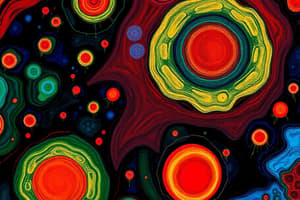Podcast
Questions and Answers
A person with the genotype sese will always be a non-secretor, regardless of their ABO blood type. Which of the following statements best explains this?
A person with the genotype sese will always be a non-secretor, regardless of their ABO blood type. Which of the following statements best explains this?
- The sese genotype prevents the formation of ABH antigens in all body tissues, including red blood cells.
- The sese genotype prevents the production of any ABH antigens, rendering the individual a universal blood donor.
- The sese genotype inhibits the production of the enzyme responsible for converting H antigen into A or B antigens.
- The sese genotype prevents the expression of ABH antigens in body fluids, but not on red blood cells or in hematopoietic tissue. (correct)
A person with the genotype SeSe and blood type AB will have which of the following characteristics?
A person with the genotype SeSe and blood type AB will have which of the following characteristics?
- They will be a secretor and will have A, B, and H antigens in their body fluids. (correct)
- They will be a secretor and will have ABH antigens in their body fluids.
- They will be a secretor and will only have AB antigens in their body fluids.
- They will be a non-secretor and will only have AB antigens in their body fluids.
An individual with the Oh (Bombay) phenotype will have which of the following characteristics?
An individual with the Oh (Bombay) phenotype will have which of the following characteristics?
- They will not be a secretor, and will have no A, B, or H antigens present in their body fluids. (correct)
- They will be a secretor, but will have no A, B, or H antigens present in their body fluids.
- They will be a secretor with both A and B antigens present in their body fluids.
- They will not be a secretor, but will have both A and B antigens present in their body fluids.
Which of the following statements is TRUE regarding the Se gene and its role in ABH antigen expression?
Which of the following statements is TRUE regarding the Se gene and its role in ABH antigen expression?
An individual with blood type O and the genotype sese will have which of the following characteristics?
An individual with blood type O and the genotype sese will have which of the following characteristics?
Flashcards
Secretor
Secretor
An individual who produces water-soluble ABH antigens in body fluids.
Non-secretor
Non-secretor
An individual who lacks water-soluble ABH antigens in body fluids.
Se gene
Se gene
Gene that controls the production of water-soluble ABH antigens.
Homozygous for se (sese)
Homozygous for se (sese)
Signup and view all the flashcards
Oh (Bombay) phenotype
Oh (Bombay) phenotype
Signup and view all the flashcards
Study Notes
Secretor Status Explained
- Secretor status relates to the presence or absence of water-soluble ABH antigens in body fluids.
- All individuals have alcohol-soluble antigens in tissues and on red blood cells, irrespective of secretor status.
- Secretors possess an additional water-soluble (glycoprotein) form of the antigen, found in various body fluids.
- Most people secrete water-soluble antigens in saliva and other fluids, matching those on their red blood cells.
Secretor Gene Control
- Production of A, B, and H antigens in saliva is controlled by the secretor gene.
- This gene (Se) is separate from the ABO and H genes.
- The allele for the secretor gene is Se, and its amorphic allele is se.
- Having at least one Se allele (either SeSe or Se se) is necessary for secretor status.
Non-Secretor Status
- Individuals homozygous for the se allele (sese) do not secrete H, A, or B antigens.
- This lack of secretion holds true regardless of whether they carry H, A, or B genes.
Secretor Gene Impact on Tissues
- The Se gene does not affect the formation of alcohol-soluble A, B, or H antigens on red blood cells or in hematopoietic tissues.
- These alcohol-soluble antigens are not present in body fluids.
Bombay Phenotype Exception
- Oh (Bombay) individuals do not secrete A, B, or H substances, even with the Se gene.
Studying That Suits You
Use AI to generate personalized quizzes and flashcards to suit your learning preferences.




